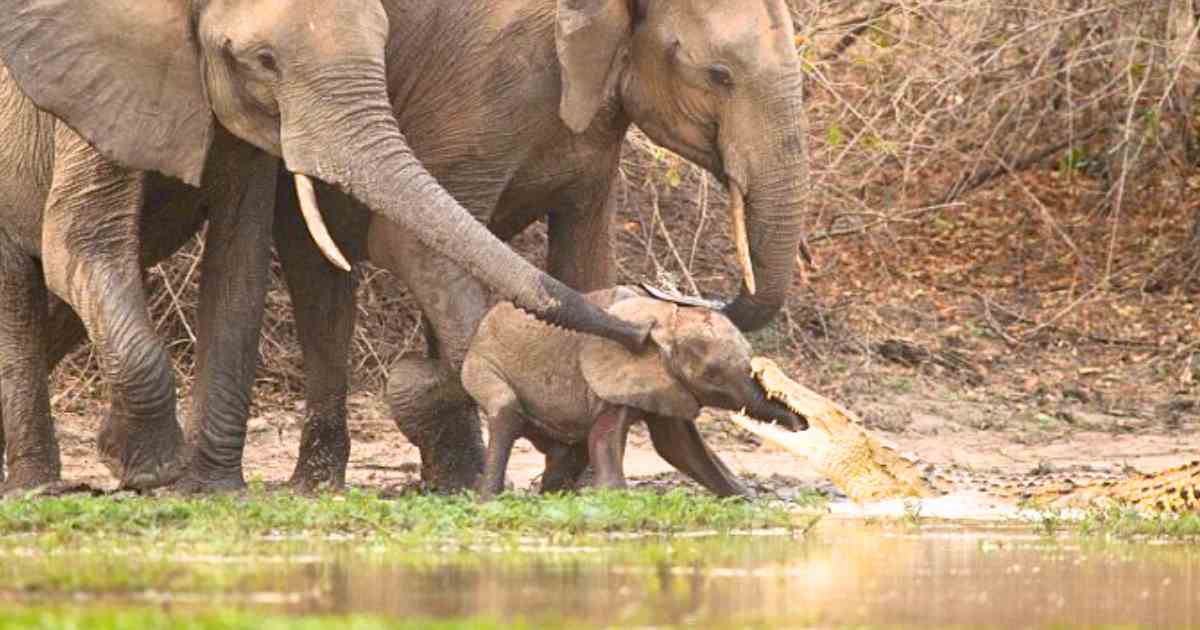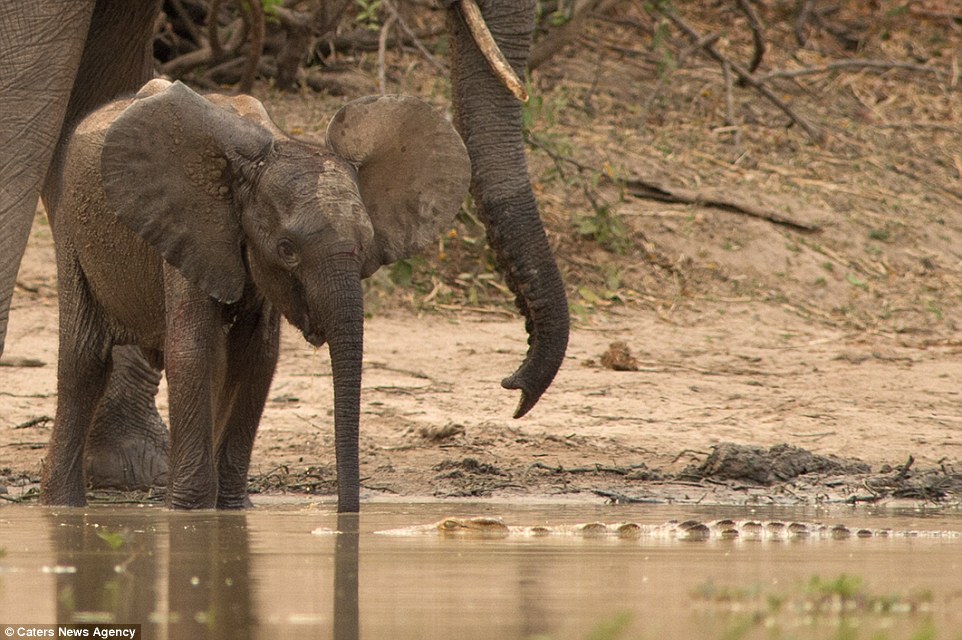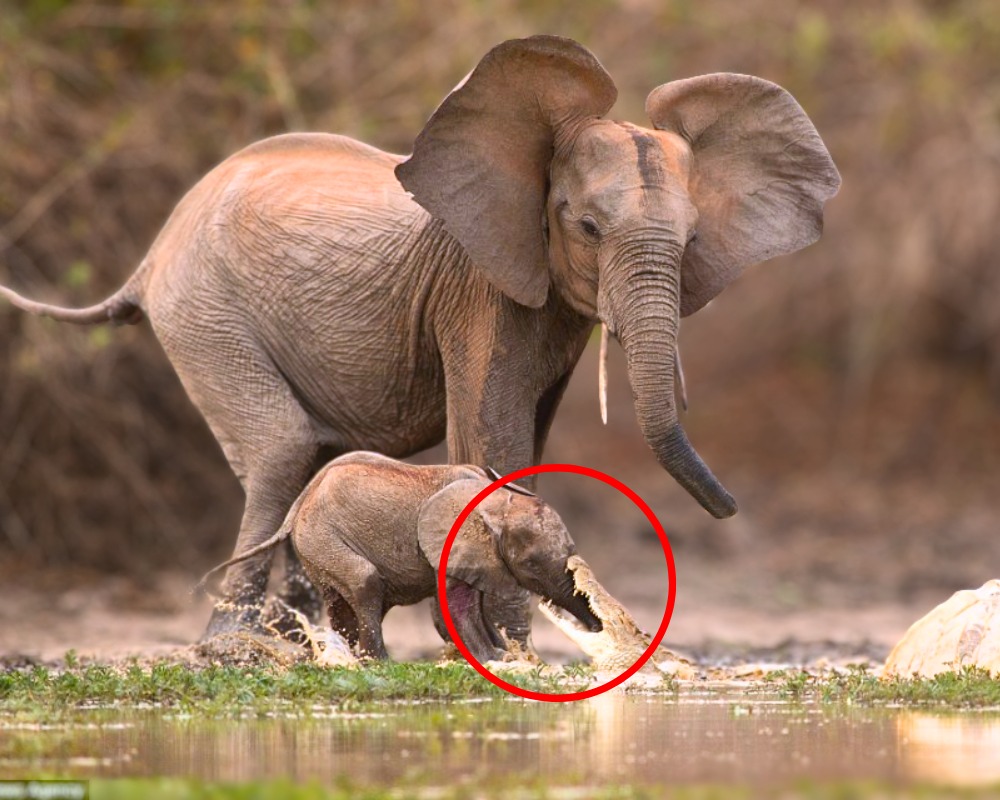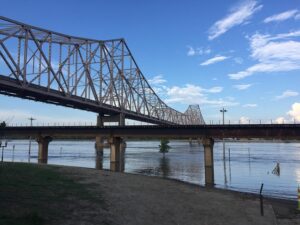Animals never stop surprising us with their courage, instincts, and will to live. In one heart-pounding moment near Mana Pools in Zimbabwe’s Zambezi Valley, a tiny elephant calf survived a terrifying attack when a crocodile burst from the water and clamped onto its trunk. What followed was a blur of trumpeting, dust, and determination—an entire elephant family rallying to save their youngest member from a silent predator lurking just feet away.
A Peaceful Drink Turns Into Panic
Late afternoon heat hung over the bush as a small herd of elephants wandered toward a shallow watering hole. Dust settled on their backs, ears flapped slowly, and the soft rumble of low communication passed between them. Among them was a playful calf, new to the rhythms of the wild and still learning how to drink. Like many young elephants, he hadn’t fully mastered his trunk. He dropped to his knees, slurping water with his mouth, and then—curious and clumsy—stretched his trunk into the murky shallows to “practice.”
In that innocent second, the surface bulged. A crocodile, patient and perfectly camouflaged, launched up like a sprung trap. Its jaws slammed shut around the calf’s trunk. The water exploded. The calf shrieked—a high, piercing sound that turned a quiet afternoon into chaos.

The Herd Reacts: Trumpets, Dust, and a Wall of Protection
Elephants are famous for their tight family bonds, and this moment showed why. The matriarch spun around, head high, ears wide, racing toward the splash. Other females formed a moving wall, their massive bodies between the predator and the herd’s vulnerable members. A teenage bull kicked up dust as he charged the water’s edge, sending a rolling cloud across the shallows. The air shook with trumpets and snorts—alarm, anger, and rallying calls all at once.
The calf, yanked forward by the crocodile’s grip, fought with everything it had. Its little legs paddled, slipped, regained footing, slipped again. It screamed and pulled, then pulled harder—pure survival flooding its veins.
Tug-of-War With a Crocodile
Crocodiles win with stealth and leverage. They strike from below, seal a hold with crushing jaws, and spin to disorient prey. But here the predator had grabbed the trunk—dangerous, yes, but not as fatal as a throat or leg hold. The calf tugged backward. The crocodile heaved forward. For a frozen few seconds, time didn’t move.
Then the herd closed in.
A lead cow surged beside the calf, stomping the water with explosive force. Another drove forward, sending a wave crashing toward the crocodile’s eyes. The teenager kicked again at the surface. The combination of the calf’s desperate pulling and the herd’s pressure shifted the balance. With a violent thrash, the crocodile lost its leverage. The calf stumbled backward—free—while the frustrated reptile slid back into the dark water with a bitter swirl.

Shaking, Squealing… and Safe
The calf collapsed onto its knees on the muddy bank, chest heaving, trunk twitching with pain. The matriarch stood guard above him, shadowing his small body with her own. She swept her trunk along his head and shoulders in quick, anxious checks—smelling, reassuring, counting, mothering. Other elephants formed a protective half-circle, eyes fixed on the water. The crocodile’s snout surfaced briefly, then disappeared. The message from the herd was clear: not today.
Within minutes, the calf steadied. He climbed to his feet and pressed against his mother’s leg, small body trembling but alive. The matriarch rumbled a low, soothing note. The herd slowly fanned out, their line shifting from defense back to movement, guiding the little one away from the shoreline and into open ground where the danger couldn’t hide.
👉 Read more inspiring life stories: Full Story: Man Loses 360 Pounds Naturally — Internet Rallies to Support His Next Step
What Makes This Escape Possible?
This close call highlights a few remarkable truths about elephant and crocodile behavior:
-
Calf learning curve: Young elephants often don’t drink with their trunks at first; they kneel and sip with their mouths. That learning window exposes them to risk near water’s edge—exactly where crocodiles wait.
-
Family response time: Elephants communicate rapidly with sound and vibration. A calf’s distress call can mobilize the herd in seconds. Their coordinated rush creates shockwaves—sound, water, dust—that can disrupt a crocodile’s hold.
-
Sheer collective force: A crocodile’s ambush is deadly one-on-one. But a united herd changes the calculus. Stomps, splashes, and a wall of massive bodies can force even a seasoned reptile to release and retreat.
The Photographer Who Waited for “That One Moment”
Zimbabwean farmer and keen photographer Francois Borman, waiting near Mana Pools for hours, witnessed the entire scene through his lens. Wildlife photographers often talk about patience—long days of quiet for a few seconds of action. This was one of those seconds. He watched the herd approach, the crocodile size up the group, the calf flop happily into the water, and then the explosion of movement and sound when predator met prey. His images freeze a moment the human eye can hardly process in real time: the grab, the scream, the surge, the release—life pivoting on a heartbeat.
Why Watering Holes Are Both Lifeline and Ambush Zone
For elephants, water is everything—drinking, bathing, cooling, social bonding, even play. For crocodiles, water is cover. It cloaks their approach, magnifies their power, and lets them strike where visibility is lowest. That’s why watering holes are simultaneously safe havens and danger zones. In the dry season especially, every species is drawn to shrinking pools, and every step to the shoreline carries risk.
Lessons From the Wild: Family, Instinct, and Survival
This rescue is more than a dramatic wildlife clip; it’s a living lesson about life in the bush:
-
Family matters. The herd’s response wasn’t random—it was practiced, instant, and deeply social. Elephants survive by caring, coordinating, and showing up for one another.
-
Curiosity has a cost. Youthful play drew the calf into danger. Learning in the wild happens with real stakes—and sometimes with scars that teach faster than any gentle lesson.
-
Predators aren’t villains. The crocodile wasn’t “cruel.” It was hungry and efficient, doing what crocodiles have done for millions of years. Balance in nature is built on such uncomfortable truths.
After the Attack: What Happens Next?
Calves that experience a scare like this often stay closer to their mothers for days. The herd may avoid the same bank for a while, shifting to deeper entries or clearer edges where visibility is better. The calf’s trunk might be tender; he’ll rely on his mouth more until the soreness fades. And he’ll remember. Elephants are famous for long memories—of danger zones, drought paths, and safe passage. Today’s fright becomes tomorrow’s wisdom.
A Story That Sticks With You
Why does this moment linger? Because it compresses a whole world of animals into seconds: innocence and risk, fear and courage, family and survival. We see the calf’s helplessness and the herd’s power; we see the predator’s patience and the prey’s will to live. And we feel the relief when the little one stands again, shaky but saved.
👉 Read next: The Hidden Meaning Behind Princess Diana’s Cannes Gown – A Heartfelt Farewell to Grace Kelly
Final Thoughts: Not Today, Crocodile
The bush doesn’t promise happy endings. But sometimes, against the odds, the smallest survivor gets another sunrise. A calf learned to be cautious. A herd proved, once more, that together is stronger. And a crocodile slipped back beneath the surface to wait for another chance. That’s the wild: unscripted, unforgiving, and full of stories that remind us why we protect it.
For those lucky enough to witness scenes like this—through a lens or in person—the message is simple: respect the water’s edge, respect the power of family, and never underestimate the courage crammed into a small, shaking body with a too-long trunk and a fierce will to live.



